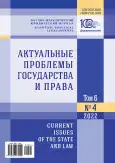On the question of the reasons and legal grounds for confiscation of industrial enterprises by the soviet authorities
- Authors: BORISOV A.A.1
-
Affiliations:
- Bar Association “Lapinskiy and Partners”
- Issue: Vol 6, No 4 (2022)
- Pages: 502-511
- Section: General Theory and History of Law and the State
- URL: https://journal-vniispk.ru/2587-9340/article/view/303879
- ID: 303879
Cite item
Abstract
The relevance of the chosen direction of research is due to the constant interest of the scientific legal community in various aspects of the legitimization of power in various historical periods. The problem of legal forms of the exercise of power allows us to single out one of these aspects, which is associated with the motives for social transformations in transitional periods of the socio-economic development of society. The October Revolution led to a change in the socio-economic system, and the stability of Soviet power was determined not only by the support of the masses, but also by the state of the economy. However, many industrial enterprises, due to the actions of the owners, were under the threat of cessation of production or closure. The purpose is to show what reasons and legal grounds led to the adoption of acts of confiscation and nationalization of enterprises in post-revolutionary Russia. Methods - historical-legal, concrete-historical, legal logic, inductive-deductive analysis. Based on scientific research and archival sources, some of which are introduced into scientific circulation for the first time, it is assumed that the socio-political activity of labor collectives at many enterprises manifested itself in appeals to authorities, which gave sociological reasons for the adoption of decrees and resolutions on the confiscation of enterprises and accelerating the process of nationalization of industry. In addition to them, ideological, political and situational (associated with the alienation of local property without the sanctions of the All-Russian Central Executive Committee and the Council of People's Commissars) reasons stand out. The legal grounds for the adoption of such acts are constitutional, legislative acts, including the regulation on worker control, and protocol decisions of authorized bodies.
About the authors
Andrey A. BORISOV
Bar Association “Lapinskiy and Partners”
Author for correspondence.
Email: andreu.borisow@yandex.ru
ORCID iD: 0000-0002-1958-9965
Attorney at the Chamber of Advocates of St. Petersburg and the Leningrad Region
Russian Federation, office 7-N, 42 lit. “A” emb. river Moika, St. Petersburg 191186, Russian FederationReferences
- Shadskiy O.G. Istoricheskiye i teoretiko-metodologicheskiye aspekty i problemy pravotvorchestva v Rossii [Historical, theoretical and methodological aspects and problems of law-making in Russia]. Pravo: istoriya i sovremennost’ – Law: history and modernity, 2020, no. 2 (11), pp. 14-21. doi: 10.17277/pravo.2020.02. pp.014-021. (In Russian).
- Pashentsev D.A., Bogolyubov S.A., Alekseyeva L.L. et al. Pravovyye osnovy rossiyskikh revolyutsionnykh preobrazovaniy 1917 goda [Legal Foundations of the Russian Revolutionary Transformations of 1917]. Moscow, INFRA-M Publ., 2020, 199 p. (In Russian).
- Munchayev S.M., Ustinov V.M. Istoriya Sovetskogo gosudarstva [History of the Soviet State]. Moscow, Norma Publ., 2008, 719 p. (In Russian).
- Pivovarova Y.S., Solovyeva A.I. (eds.). Istoriya rossiyskoy politicheskoy nauki [History of Russian Political Science]. Moscow, Aspect Press, 2015, 471 p. (In Russian).
- Lenin V.I. Agrarnaya programma sotsial-demokratii v pervoy russkoy revolyutsii 1905–1907 godov. Sochineniya. T. 13 [The Agrarian Program of Social Democracy in the First Russian Revolution of 1905-1907. Works. vol. 13]. Moscow, OGIZ, Gospolitizdat Publ., 1947, 492 p. (In Russian).
- Dorskaya A.A. Krizisnyye yavleniya v prave i puti ikh preodoleniya: teoreticheskiy i istoriko-pravovoy analiz [Crisis Phenomena in Law and Ways to Overcome Them: Theoretical and Historical-Legal Analysis]. Saint-Petersburg, Asterion Publ., 2021, 160 p. doi: 10.53115/9785001881100. (In Russian).
- Antonchenko V.V. Pravo i zakon [Law and legislation]. Aktual’nyye problemy gosudarstva i prava – Current Issues of the State and Law, 2022, vol. 6, no. 2, pp. 123-131. doi: 10.20310/2587-9340-2022-6-2-123-131. (In Russian).
- Syrykh V.M. Stanovleniye osnov Sovetskogo zakonodatel’stva v 1918–1920-e gody [Formation of bases of the Soviet legislation in the 1918–1920s]. Istoriko-pravovyye problemy: Novyy rakurs – Historical-Legal Problems: the New Viewpoint, 2013, no. 6, pp. 174-191. (In Russian).
Supplementary files








